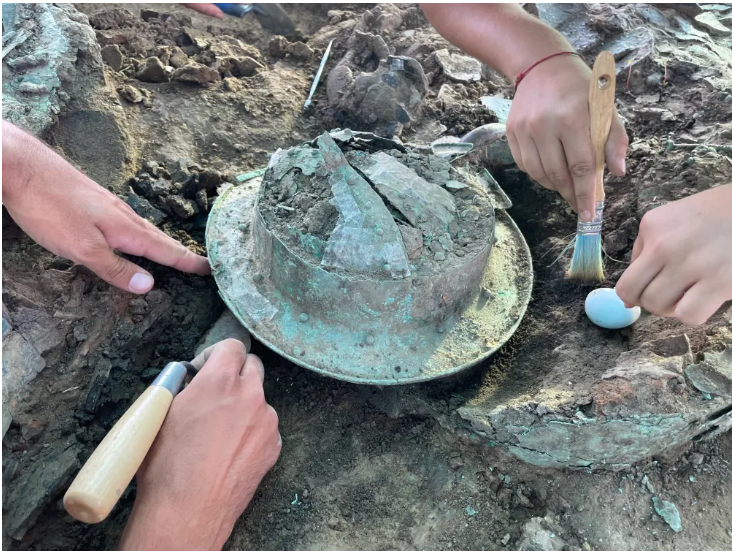Aristocratic Tomb Discovered in Italy Offers Clues to a Mysterious Pre-Roman Civilization
Archaeologists in Corinaldo, a small town in the Marche region of coastal Italy, have unearthed an Iron Age tomb loaded with more than 150 noteworthy objects, like a two-wheeled chariot and a bronze helmet dating back to the seventh century B.C.E.
The tomb features a 12-by-7-foot rectangular pit surrounded by a circular basin with a 100-foot diameter. The presence of a cauldron, decorated pottery, utensils and an ax for cutting meat suggests the site was not just a burial ground but also the location of a lavish funerary banquet and ritual.
Researchers suspect the tomb belonged to a prince or someone of similar social status who was a member of the Piceni people, according to a statement from the city of Corinaldo.
/https://tf-cmsv2-smithsonianmag-media.s3.amazonaws.com/filer_public/47/ed/47edc137-cdeb-4779-b1c9-abefc64e07db/artifacts1.jpg)
The Piceni were an Italic people who lived on the Adriatic coast between the ninth and third centuries B.C.E. This haul of objects gives researchers deeper insight into the material culture of the Piceni aristocracy and their elaborate processes of mourning the dead.
Among the major implications of the discovery is the realization that the Piceni traded more frequently with other Italic civilizations than previously known. Several artifacts, for instance, appear to come from the influential Etruscans, who practiced advanced agriculture and art and, like the Piceni, eventually succumbed to the expanding Roman Republic around the third century B.C.E.
The tomb is part of the Corinaldo Necropolis, an archaeological site along the Nevola River.
/https://tf-cmsv2-smithsonianmag-media.s3.amazonaws.com/filer_public/b9/49/b94967ce-dc0d-4a93-9a6f-17b95cbf0817/artifacts3.jpg)
Previously understudied, the necropolis has been under investigation by the ArcheoNevola Project—led by Federica Boschi, an archaeologist at the University of Bologna, and Cecilia Carlorosi and Ilaria Venanzoni, researchers with the province of Ancona’s archaeological authority—since 2017.
The team made its first major discovery, a similar princely tomb, in 2018. As Boschi told Live Science’s Laura Geggel in 2020, the “extraordinary collection of cultural material” found in the Iron Age grave, including an intact war chariot, offered “unequivocal testimony to the aristocratic status of [its] owner.” This latest find further hints at a significant concentration of the highest classes of Piceni society in the necropolis.
Some 2,600 years after the Piceni’s peak, their civilization’s rich past, long obscured in the shadows of the Romans, is finally coming into view.
“Corinaldo can boast the title of the Land of Princes,” says Mayor Gianni Aloisi in the statement, per a translation by Newsweek’s Aristos Georgiou. “[This is] a discovery that confirms the historical and cultural value of the Nevola archaeological area, that will allow us to know, and perhaps rewrite, the history of our community.”
